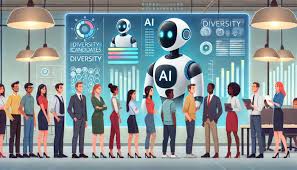In recent years, organisations have increasingly recognised the importance of diversity and inclusivity in the workplace. A diverse workforce not only brings different perspectives and fosters innovation but also strengthens company culture and improves employee satisfaction. However, traditional hiring processes have often been plagued by unconscious bias, whether stemming from human subjectivity, cultural stereotyping, or other factors. The advent of Artificial Intelligence (AI) in recruitment holds tremendous potential to address these challenges, creating a more equitable and inclusive hiring environment.
Furthermore, AI can be programmed to actively encourage diversity. For instance, algorithms can be designed to include.
Artificial Intelligence (AI) technologies are becoming integral to businesses and public markets alike, enabling innovation and efficiency and creating avenues for economic growth. The emphasis in public discourse has been on the technological advances enabled by AI and the risks and benefits associated with them. It is equally important that discussions on market implications of firm behaviour active in AI are also understood. This report explores the evolving market dynamics in India and the critical challenges faced by policymakers and regulators in creating a competitive and innovative AI ecosystem. The report also examines the AI technology stack, highlighting its distinct layers and their implications for industrial organisation and market competition. Key themes include the role of major cloud providers in shaping the AI ecosystem, the complexities of open-source models, the expanding network of partnerships between global technology companies, AI startups, and domestic Information Technology (IT) incumbents, and the creation of new dependencies. Drawing on global best practises, the report emphasises the need for a nuanced mix of competition and industrial policies, including a Digital Public Infrastructure paradigm, to foster a competitive, inclusive, and innovative AI ecosystem in India. It also highlights India’s push for technological sovereignty through initiatives like the IndiaAI Mission and investments in indigenous AI models and supercomputing capabilities. The recommendations proposed in the report include promoting interoperability, enhancing access to computing resources, strengthening data-governance frameworks while facilitating access to high-quality open datasets, and leveraging public-private partnerships to support emerging AI startups.
Leveraging digital twins, artificial intelligence (AI) and data governance to create a more robust manufacturing and adaptable supply chain is the need of the hour. Global disruptions, from natural disasters to geopolitical conflicts, underscore the importance of resilient supply chains. The ability to anticipate, adapt, and recover quickly is of paramount importance. Volatility and unpredictability are the norms. Manufacturers and distributors are actively seeking ways to mitigate risks and disruptions. This involves diversifying suppliers, establishing regional sourcing strategies, and implementing robust risk-management frameworks. Supply chain leaders must embrace agility and be prepared to navigate through unforeseen challenges.
Data is the lifeblood of modern manufacturing and effective data governance is essential. This involves establishing clear policies and procedure.
In the last decade, India’s internet economy has exploded on the shoulders of the Jan Dhan, Aadhaar and Mobile (JAM) trinity. Digital democratisation, powered by near-universal access to banking, has created a massive market for digital services. With over 900 million smartphone internet connections, the Indian digital ecosystem has shifted drastically from being an exporter of software and skilled labour to becoming the world’s largest real-time payment market.
We are witnessing a breakaway from the conventional teaching methods towards modernisation brought about through the adoption of Artificial Intelligence (AI). IBEF has published statistics indicating that the Indian edtech market is expected to grow from a value of $700-800 million in 2021 to $30 billion by 2031. This growth shows the penchant for digital learning solutions that rely on AI to provide more personalised, efficient, and accessible education. Besides, a report by KPMG says that India is now the second-largest market for e-learning, after the United States, clearly indicating the country’s strong digital learning transformation.
Amid growing technological change, sustainability has become a key concept of information technology (IT) strategies for the future. The two elements of the environment have now become working hand in hand as they determine how organisations function and expand. Businesses are realising that the inclusion of sustainability solutions into organisational IT architectures has both positive environmental impacts across the globe and economic benefits of cost reduction and protection from interruptions.
Sustainability is no longer a ‘nice-to-have’—it’s a strategic imperative, IT leaders must pivot from traditional practises and focus on building IT systems that are energy-efficient, scalable, and aligned with organisational sustainability goals.
The IT sector is now considered one of the largest energy consumers globally, and data centres bear more than a third of the total consumption. Second, on the use aspect, the new challenge surfaces-electronic waste, where millions of tons of old or dysfunctional devices are dumped yearly. To overcome these tasks, there is a need for a transition to renewable energy sources, environmentally sound hardware acquisition, and applied circular economy concepts.







